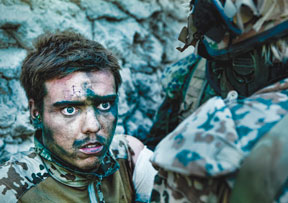Armadillo
 DENMARK / 2010 / Danish, English / Color / 35mm / 101 min
DENMARK / 2010 / Danish, English / Color / 35mm / 101 min
Director, Script: Janus Metz
Photography: Lars Skree
Editing: Per K. Kirkegaard
Sound: Rasmus Winther Jensen
Producers: Ronnie Fridthjof, Sara Stockmann
Production Company: Fridthjof Film
World Sales: DR TV, International Sales www.drsales.dk
A depiction of tension-filled days at Camp Armadillo on the Helmand frontline in Afghanistan, this film closely follows Danish soldiers stationed there for peacekeeping operations. As they adapt to their high-pressure daily routine, which includes skirmishes with the Taliban, the soldiers gradually become addicted to the adrenaline rush. Director Janus Metz, who has also made television drama series, propels the story forward at an exhilarating pace. The camera keeps shooting as the soldiers exchange fire with the enemy, revealing their frenzied emotional state.
[Director’s Statement] With Armadillo, I was curious to explore how the micro level of war—where human interaction takes place—affects one of the greatest conflicts of our time. How politics meets practice in the war zone.
In the early research for the project, when I first met the young soldiers, I was surprised that the majority of those who had already been to war had a desire to return. Their experiences were violent and bloody, but they all talked with great excitement about battle and about the strong bonds and feelings of unity with their fellow soldiers. Everyday life at home seemed to have become boring in comparison with the intensity of war. It seemed like an addiction.
This puzzled me to the extent that I wanted to try and put myself in the soldiers’ shoes. Why do they want to go to war? Is it to change the world and make a difference? Is it excitement? Personal ambitions? Is it something else . . . and how do these things affect each other as well as the conflict at large? What impact does this “addiction” have on the situation in Afghanistan? How does it affect the soldiers’ ability to assess a difficult situation? What does it mean to the way local Afghans perceive the foreigners in their country? Does it have an effect the other way round—on the nations that lead these “democracy wars”—and what does it tell us about young people of our time?
I’ve always been interested in making films about people who go through life-altering experiences. Such an experience involves a “rite of passage,” where people are ultimately faced with themselves and their own humanity: it is universal and basic. In the context of wars and the young men who fight them, I was interested to find out how the perception of masculinity, the good, the bad, the civilized and the barbaric, is reflected in action, and how these concepts are adapted in this “coming of age” story.
 Janus Metz
Janus Metz
Born in Denmark in 1974, Janus Metz made his breakthrough as a director with two films on marriage migration, prostitution, and globalization, Love on Delivery (2008) and Ticket to Paradise (2008). He has received numerous recognitions for his work, including a nomination for the Silver Wolf prize at the International Documentary Film Festival Amsterdam. His films have been screened by broadcasters all over Europe. Metz, who holds a Master Degree in Communications and International Development Studies, has also written various articles on documentary film. Metz’s first feature-length documentary, Armadillo was the winner of the Grand Prix at the Semaine de la Critique at the 2010 Cannes Film Festival. |
